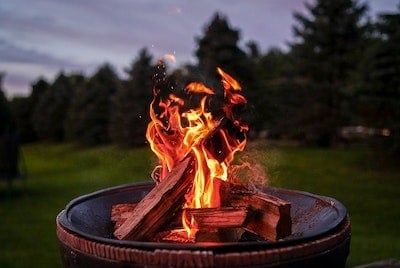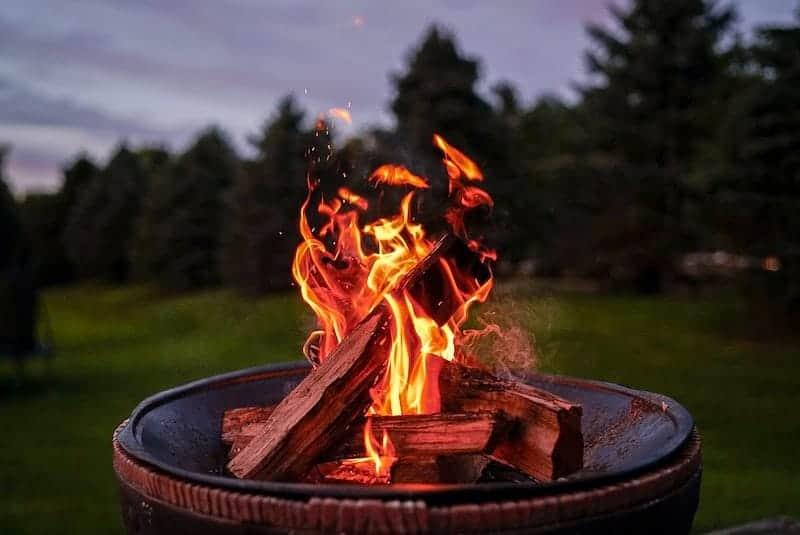How to Avoid a Rusty Fire Pit
Summer is here, and it’s peak fire pit season! Who doesn’t love spending some time outside huddled around with friends at a fire pit? It’s a great relaxing summer pass time you can easily enjoy. But what happens when your fire pit rusts? Why does this happen, and how can you prevent it? I want to answer these questions and tell you how to treat your rusted fire pit best!
So, why does my fire pit rust? Rust occurs when iron or steel corrodes in the presence of oxygen and water. So having your fire pit outside exposes it to the weather. Rain naturally makes iron and steel rust. Typically, the rain will cause your outdoor furniture, including your fire pit to rust.
Rust is also more common with extended use. Consistent use can break down any heat-resistant coating or finish, which can compromise the structure or components. When the metal weakens, it’s more susceptible to rusting.
Preventing Rust On Your Fire Pit
To ensure that your fire pit doesn’t rust, there are several preventative measures you can take. Here are a few that you can try:
Move Your Fire Pit Inside
If possible, you can store your fire pit indoors. The garage or under a covered area like the patio are excellent places to keep your fire pit dry and stored when you aren’t using it. If the fire pit is too heavy, you can use something like a dolly to help you quickly move it.
Waterproof Cover
If you’re unable to move your fire pit, you can invest in a quality weatherproof cover for your fire pit. A cover can help to prevent rust and keep water out. Some fire pit brands sell covers separately, so be sure to check their options when you buy. If they don’t, you can find well-suited covers online or at a local hardware shop.
Finding an appropriate cover is essential to blocking out moisture. So, ensure that you find a cover that is a good fit and covers your fire pit adequately. Also, when you put a cover on your fire pit, you want to make sure that it is entirely dry. If not, you may even promote the rusting process and speed it up. If you trap moisture inside your fire pit with the cover, you’ll create the perfect environment for rust to develop.
Elevate Your Fire Pit
 If you can, keep your fire pit off the ground. Even if it’s on the patio or in the grass, water can collect anywhere.
If you can, keep your fire pit off the ground. Even if it’s on the patio or in the grass, water can collect anywhere.
You can use bricks or stone pavers to prop your fire pit above ground level to prevent it from accumulating or sitting in water for long periods of time.
Watch the Weather
Checking the weather forecast before you start a fire can help you know when to light a fire. It may take a while for your fire to go out completely, so you’ll want to know when to expect rain.
Natural Internal Barriers
Using a natural barrier inside your fire pit can help prevent interior paint or other coatings from burning off. Over time, the heat damages your fire pit’s interior and can weaken it, making it more prone to rusting. Instead, you can put sand in the bottom of your fire pit.
The layer of sand will provide a thermal barrier between the fire and the bottom of the fire pit, which usually takes the most heat damage. You can use fire-proof silica sand as an effective heat barrier.
Do All Fire Pits Rust?
Generally, most fire pits do rust when they’re exposed to the elements for an extended amount of time. Types of metals that don’t show signs of rust for a more extended time include stainless steel and galvanized steel. The steel used for furniture like fire pits is often thicker, making them more structurally sound. So, even if it rusts, they’ll often be less affected as fire pits made of different materials.
Cleaning Your Fire Pit
Keeping your fire pit clean can be crucial to preventing rust. Any leftover ash can absorb moisture from rain or in the air. That moisture can sit directly next to the surface of the metal, causing it to rust. Because the inner surface of your fire pit is what endures the most heat, it’s most susceptible to rusting.
Now you may be wondering what to do with fire pit ashes. Well whenever you clean your fire pit, ensure that there isn’t any heat being generated by the pit and all the coals are out. Then, dump the ashes safely and ensure that they will not start another fire. If you leave or discard them and they aren’t entirely out, they can unintentionally create a fire. You can also use an ash vac to clean up the ashes.
Caring for Your Fire Pit
Caring for your fire pit is something that you can do to prevent future rust. Follow these tips to ensure that you care for your fire pit as much as possible.
- Remove debris and ash after each fire. Ashes that accumulate help encourage rust because ash absorbs moisture from the air, reacting to the metal to create rust.
- Dust regularly with a dry, soft cloth.
- Oil your fire pit regularly to help reduce the build-up of rust and keep it looking nice.
Treating Rust
Hopefully, you’ll notice rust before it starts to spread, but if you need to treat minor rust, follow these steps:
- Use water and soap to clear away any debris and any surface rust that is easily displaced.
- You can then sand down the areas with rust until it’s no longer visible. You can use masking tape to prevent unintentional damage to the surrounding areas. If you use a sander, use fine-grit sandpaper (220 or above) to sand down rusted areas. Ensure that you wear a respirator while sanding!
- Wipe off any excess dust.
- After you’ve sanded away the rust, use high-temperature spray paint to apply a light coat to the sanded area. Allow it to dry completely before adding additional coats.
If your fire pit is completely rusted, you may want to consider whether or not it’s worth treating the rust rather than replacing the entire fire pit. If the whole fire pit is rusted or significant holes are resulting from the rust, it may be time for you to replace it altogether.
Other Fire Pit Options
If you haven’t purchased a fire pit, there are various options for you to consider. If you don’t believe you’ll be able to maintain the type of fire pit that’s been mentioned, you may want to consider gas-powered or smokeless fire pits.
Gas-powered fire pits don’t leave any ash behind. A smokeless fire pit also leaves less ash behind compared to a traditional fire pit. On the other hand, if you’re looking for a low-maintenance fire pit, a wood-burning fire pit may be a good solution.
If you’re considering what material is recommended for your fire pit, consider stainless steel. Stainless steel is naturally designed to be more rust-resistant. However, just like any other metal, it will eventually rust over time. However, stainless steel fire pits have been proven to resist rusting better than other materials. These fire pits are often strong, durable, look nice, and cost less than other fire pits.
When you decide to choose a fire pit, you’ll want to take the thickness of the fire pit into account. The steel thickness, or the gauge, will also help determine how well it will prevent rusting. If you end up installing or purchasing a lighter-weight fire pit, it will require more attention to last just as long.
How to Make Your Fire Pit Last
Overall, how long your fire pit lasts, will depend on a few things like the quality of the fire pit itself, the local weather, and the thickness of the metal. Hopefully, you’ve learned to keep your fire pit in a dry area, covered and out of the elements when you aren’t using it. Keep your fire pit clear of debris and clean after each burn. Finally, keep an eye out for potential rusting.

